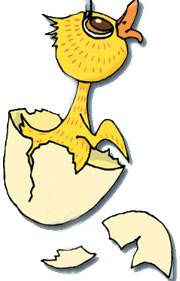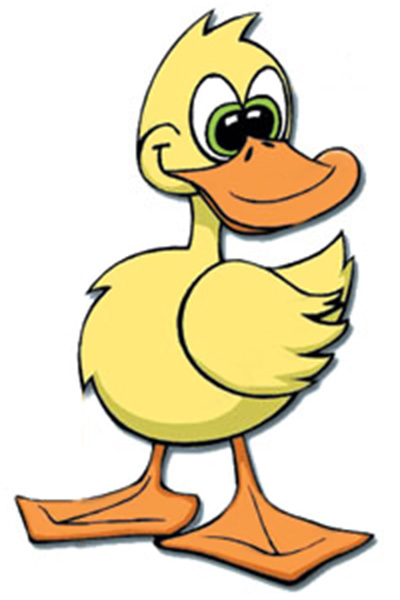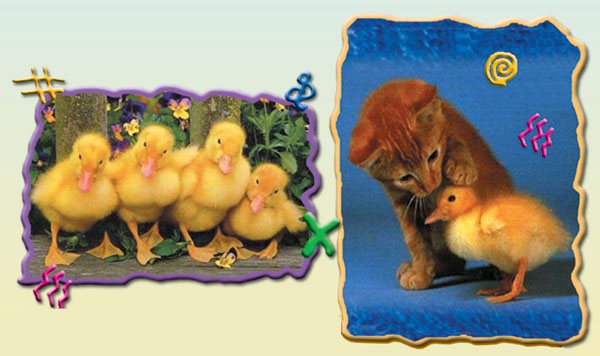Ahmad had gone with his family to visit his grandfather at the week-end. Before dinner, as usual, Ahmad's grandfather took him to the park. When they arrived at the park, Ahmad was very happy to see the ducks swimming in the pond. His grandfather knew that Ahmad really liked ducks, so he had brought something along to feed them with. He gave it to Ahmad, and they sat there together on a bench. Ahmad ran toward the ducks.
"Hi," he said: "My name is Ahmad. I brought you some food."
One of the ducks there said, "Hi, Ahmad, thank you very much."
"I was thinking," said Ahmad: "If they didn't feed you here, or if you lived somewhere where there were no human beings, how would you find food?"
 |
The duck answered: "We ducks don't often leave the water when we live in the wild. We get our food from the water."
"But I don't see any food in the water where you are swimming," said Ahmad, puzzled.
The duck explained: "We get our food from the water in several ways. Some ducks stay on the surface of the water and eat plants and insects. Others dip their heads and the front part of their bodies under the water and look for food with their tails in the air. And still others dive right under the water and search for all their food in that way."

Ahmad had another question: "Why do you stay in the water all the time? Why don't you walk around on the land?"
"Our webbed feet let us swim around in the water, and we can swim very quickly, but it is hard for us to walk on land," the duck told him.
Ahmad then asked the duck: "When I go into the water, I always have to keep moving to stay afloat. So, I have to use water wings to stop myself from sinking. How do you manage to stay afloat for so long?"
"Just as you don't have to move to stay afloat when you use your water wings, so the air in our bodies lets us stay on top of the water," the duck answered.
Ahmad was still puzzled: "But when I wear water wings, I can't dive under the water. How do you manage to do it?"
"We have air sacs in our bodies that look like little balloons," said the duck. "When these sacs are filled with air, we stay afloat; and when we want to dive under the water, we pump the air out of those air sacs. So we can dive easily because there is less air left in our bodies."
"So, you can stay on top of the water, and you can dive under it, and you can swim beautifully," said Ahmad.
 |
The duck went on: "It is because of our webbed feet that we can swim so easily. When we move our feet forward or backward in the water, these webs spread out and allow us to push ourselves against the water with more force."
"Just like the flippers that grown-ups put on their feet when they go swimming in the summer so they can swim faster and easier!" exclaimed Ahmad.
"That's it, Ahmad," the duck agreed. "If your human feet were like that you would not be able to walk comfortably. Because we are water birds, however, the shape of our feet lets us swim and feed ourselves very easily."
"All ducks look alike, so what kind of differences are there between them?" wondered Ahmad.
"We do all look alike," agreed the duck: "But there certainly are a number of differences between the various kinds of ducks. Male ducks have shinier feathers than females. This is an important protection for the female as she sits on her nest to hatch her young. Because of her dull colors, her enemies can't see her, and she is much safer as she sits there. The female duck's dull colors that blend in with the background make her difficult to spot even from a close distance."
"So, what happens when an enemy comes near the nest?" asked Ahmad.

The duck explained: "The male ducks draw attention to themselves by using their colorful shiny feathers in order to draw the enemy's attention away from the female in her nest. When an enemy approaches the nest, the male immediately flies into the air, making a lot of noise and doing everything he can to drive the intruder away."
At that moment Ahmad saw some baby ducks swimming in the water. He was amazed that they were so small and could swim so well. He asked: "How do these baby ducks learn to swim so quickly?"
"Baby ducks manage to make their way to the water to swim and feed themselves just a few hours after they hatch," the duck informed him.
Ahmad wondered what would happen to him if they left him in the water a few hours after he was born. He would certainly not be able to swim; he would swallow a lot of water and die. He considered how perfectly Allah had created ducks so that they can live, swim and feed themselves in the water. Then Ahmad's grandfather got up from the bench and came up beside him.
"Grandpa," said Ahmad: "Ducks can swim really well, can't they? And they're so cute!"
His grandfather agreed: "Yes, Ahmad. Just one of their special qualities shows us how perfectly Allah has created every living thing. Did you know that ducks can also fly? When they fly, they keep changing direction so that they will not fall prey to wild birds."
"How do the ducks know that they have to change direction all the time to escape predators, Grandpa?" he asked.
His grandfather told him: "Just as Allah has given special qualities to other animals, he gave this one to cute ducks so that they can protect themselves. Allah creates what He wills. There is a verse about this in the Qur'an: 'Allah created every animal from water. Some of them go on their bellies, some of them on two legs, and some on four. Allah creates whatever He wills. Allah has power over all things.' (Surat an-Nur: 45)"
"Come on Ahmad," he said: "Dinner is almost ready. We'd better make our way back home."
"OK Grandpa. I'll tell you what I learned about ducks on the way!"
"Really?" asked his grandfather. "Now where did you learn all this from?" Ahmad winked at the ducks in the water and said good-bye.
Ahmad took his grandfather's hand and left the ducks behind. They walked home together talking about Allah's perfect creation and giving thanks for it.
 |
DucksWhen they fly, ducks, like cheetahs, can go as fast as a car. And when they fly, they continually change direction so as not to became prey for predators. When they have to dive under the water, they do it so quickly that hunters have difficulty shooting them. |